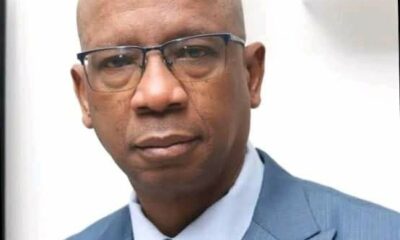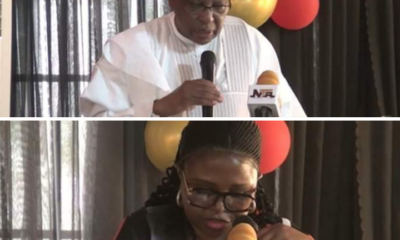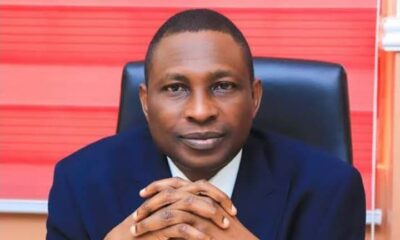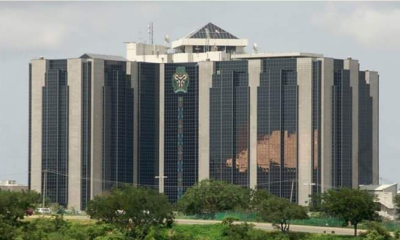Politics
[FULL TEXT] Buhari Explains Why He Didnt Sign Electoral Act Bill 2021


President Muhammadu Buhari has explained why decided to not sign the Electoral Act (Amendment) Bill 2021 passed by the National Assembly was read on the floor of the Senate on Tuesday into law.
Senate President, Ahmad Lawan, read the letter during the start of plenary after the chamber came out from a closed session.
The closed session which lasted for thirty-seven minutes started at exactly 10:44 am ended 11:21 am.
President Buhari in the letter dated December 13, 2021, explained that his decision to withhold assent to the electoral bill was informed by advice from relevant Ministries, Departments, and Agencies of Government after a thorough review.
According to the President, signing the bill into law would have serious adverse legal, financial, economic and security consequences on the country, particularly in view of Nigeria’s peculiarities.
He added that it would also impact negatively on the rights of citizens to participate in the government as constitutionally ensured.
The full text of the letter titled, “WITHHOLDING OF ASSENT TO ELECTORAL ACT (AMENDMENT) BILL 2021” reads:
“Further to the letter dated 18th November, 2021 forwarded for Presidential assent, the Electoral Act (Amendment) Bill 2021 as passed by the National Assembly, I have received informed advice from relevant Ministries, Departments and Agencies of the Government, and have also carefully reviewed the Bill in light of the current realities prevalent in the Federal Republic of Nigeria in the circumstances.
“Arising from the review, Mr. Senate President may wish to note that the conduct of elections for the nomination of party candidates solely via direct primaries as envisaged by the Electoral Act (Amendment) Bill 2021 has serious adverse legal, financial, economic and security consequences which cannot be accommodated at the moment considering our Nation’s peculiarities. It also has implications on the rights of citizens to participate in the government as constitutionally ensured.
“The Electoral Act (Amendment) Bill 2021 seeks to amend certain provisions of the extant Electoral Act 2010. Part of the objective of the Bill is the amendment of the present Section 87 of the Electoral Act, 2010 to delete the provision for the conduct of indirect primaries in the nomination of party candidates such that party candidates can henceforth only emerge through direct primaries.
“Arising from the review, Mr. Senate President may wish to particularly note the pertinent issues implicated as follows to wit:
“The conduct of direct primaries across the 8,809 war the length and breadth of the country will lead to a significant spike in the cost of conducting primary elections by parties as well as increase in the cost of monitoring such elections by INEC who has to deploy monitors across these wards each time a party is to conduct direct primaries for the presidential, gubernatorial and legislative posts.
“The addition of these costs with the already huge cost of conducting general elections will inevitably lead to huge financial burden on both the political parties, INEC and the economy in general at a time of dwindling revenues.
“The indirect consequences of the issues of high cost and monetization are that it will raise financial crimes and constitute further strain on the economy. It will also stifle smaller parties without the enormous resources required to mobilise all party members for the primaries. This is not healthy for the sustenance of multi-party democracy in Nigeria.
“In addition to increased costs identified above, conducting and monitoring primary elections across 8,809 wards will pose huge security challenges as the security agencies will also be overstretched, direct primaries will be open to participation from all and sundry and such large turn-out without effective security coordination will also engender intimidation and disruptions, thereby raising credibility issues for the outcomes of such elections.
“The amendment as proposed is a violation of the underlying spirit of democracy which is characterized by freedom of choices.
“Political party membership is a voluntary exercise of the constitutional right to freedom of association. Several millions of Nigerians are not card-carrying members of any political party.
“Thus, the emphasis should be on enabling qualified Nigerians to vote for the candidate of their choice during general elections as a means of participation in governance and furtherance of the concept of universal adult suffrage or universal franchise.
“The proposed amendment may also give rise to plethora of litigations based on diverse grounds and issues of Law including but not limited to the fact that the proposed amendment cannot work in retrospect given that the existing constitution of the Parties already registered with the Independent National Electoral Commission (INEC) permits direct, indirect and the consensus primaries. This real possibility, will, without doubt, truncate the electoral program of the Nation as another electoral exercise is imminent towards a change of Government in 2023.
“Nigeria is at the moment still grappling with the issues of monetization of the political process and vote buying at both party and general elections. The direct implication of institutionalizing only direct primaries is the aggravation of over-monetization of the process as there will be much more people a contestant needs to reach out to thereby further fuelling corruption and abuse of office by incumbent contestants who may resort to public resources to satisfy the increased demands and logistics of winning party primaries.
“Direct primaries are also subject or susceptible to manipulation or malpractices as most parties cannot boast of reliable and verified Membership Register or valid means of identification which therefore means non-members can be recruited to vote by wealthy contestants to influence the outcome. Rival parties can also conspire and mobilize people to vote against a good or popular candidate in a party during its primaries just to pave way for their own candidates. Whereas where voting is done by accredited delegates during indirect primaries, the above irregularities are not possible.
“The major conclusions arrived at upon the review are highlighted hereunder, to wit:
“Asides its serious adverse legal, financial, economic and security consequences, the limitation or restriction of the nomination procedures available to political parties and their members constitutes an affront to the right to freedom of association. It is thus undemocratic to restrict the procedure or means of nomination of candidates by political parties, as it also amounts to undue interference in the affairs of political parties.
“Indirect primaries or collegiate elections are part of internationally accepted electoral practices. More so, direct primaries are not free from manipulations and do not particularly guarantee the emergence of the will of the people especially in circumstances like ours where it is near impossible to sustain a workable implementation framework or structure thereof.
“In the premise of the above, I hereby signify to the National Assembly that I am constrained to withhold assent to the Electoral Act (Amendment) Bill 2021 in line with the provisions of Section 58(1) & (4) of the 1999 Constitution (as amended).
“It is my considered position that the political parties should be allowed to freely exercise right of choice in deciding which of direct or indirect primaries to adopt in the conduct of their primary elections as their respective realities may permit.”
Politics
Lagos Water Corporation Starts Protest Against Sack Of Workers


Some workers’ unions have commenced a protest over the sack of workers of the Lagos State Water Corporation (LWC) by the state government.
On Wednesday, the workers commenced the protest rally at the Ikeja under-bridge while heading towards the Lagos house of assembly complex in Alausa.
Workers under the aegis of the Amalgamated Unions of Public Corporations Civil Service Technical and Recreational Services Employees (AUPCTRE) and other unions are at the protest.


In April, the Lagos government announced the disengagement of 391 LWC workers “as part of its ongoing restructuring efforts aimed at enhancing operational efficiency and meeting the evolving demands of the organisation”.


The state government said the corporation has been battling “financial and operational challenges, struggling to generate adequate revenue to meet its obligations”.




In December 2023, the state government also sacked 450 casual workers of the corporation.
Politics
“Fuel Subsidy Removal Was A Necessary Action To Prevent Nigeria From Going Bankrupt” – President Tinubu


President Bola Ahmed Tinubu has said that fuel subsidy was removed to save Nigeria from going bankrupt.
In as much as the hardship in the country has taken a toll on both the rich and the poor, Especially the poor, President Tinubu has justification for the decision he took on fuel subsidy removal.
Speaking as one of the panelists at the ongoing World Economic Forum in Riyadh, Saudi Arabia on Sunday, April 28, Tinubu said he was convinced it was in the best interest of the people.
He said;
“For Nigeria, we are immensely consistent with belief that the economic collaboration and inclusiveness are necessary to engender stability in the rest of the world.
“Concerning the question of the subsidy removal, there is no doubt that it was a necessary action for my country not to go bankrupt, to reset the economy and pathway to growth.
“It is going to be difficult, but the hallmark of leadership is taking difficult decisions at the time it ought to be taken decisively. That was necessary for the country.
“Yes, there will be blowback, there is expectation that the difficulty in it will be felt by greater number of the people, but once I believe it is their interest that is the focus of the government, it is easier to manage and explain the difficulties.
“Along the line, there is a parallel arrangement to really cushion the effect of the subsidy removal on the vulnerable population of the country. We share the pain across board, we cannot but include those who are vulnerable.
“Luckily, we have a very vibrant youthful population interested in discoveries by themselves and they are highly ready for technology, good education committed to growth.
“We are able to manage that and partition the economic drawback and the fallout of subsidy removal.”
As a Nigerian citizen, what do you think about the Government’s decision to avert bankruptcy by removing fuel subsidy?
Politics
Enugu State Government Flag Off Palliative Distribution In The State


The Governor Of Enugu State, Peter Mbah has pioneered the distribution of food to the people of the state who are in dire need. He said this is in collaboration with the Federal Government to reduce the economic hardship in the country.
Via his social media platform, He wrote;
“Earlier today, we flagged off another round of palliative distribution in our state.
This is a collaborative effort between our administration and the federal government to cushion the effects of the economic hardship in the country.
I have directed the committee in charge of the palliative distribution to ensure that the items get to those in dire need of them.”
Here are pictures from the palliative distribution flag off.










-



 Politics6 hours ago
Politics6 hours agoLagos Water Corporation Starts Protest Against Sack Of Workers
-



 News2 days ago
News2 days ago“80% Of Buildings In Lekki Have No Approval” – Lagos State Commissioner For Physical Planning & Urban Development Reveals
-



 Education5 days ago
Education5 days agoFederal Government Sets To Commence School-To-Work Scheme
-



 News4 days ago
News4 days agoLady Dies After Friends Pushed Her Into Boiling Pot Of Fresh Pepper In Delta State
-



 Finance4 days ago
Finance4 days agoEFCC Chairman Tasks Nigerian Youths Against Crimes And Fraudulent Acts
-



 Entertainment2 days ago
Entertainment2 days agoCelebrities Turn Up For The Dedication Of Ali Baba’s Triplets In Lagos
-



 Finance1 day ago
Finance1 day agoBanks To Now Charge 0.5% Cybersecurity Levy As Directed By CBN; Netizens React
-



 TechNews2 days ago
TechNews2 days agoSIM Boxing, And The Unboxing of a Crime Syndicate







